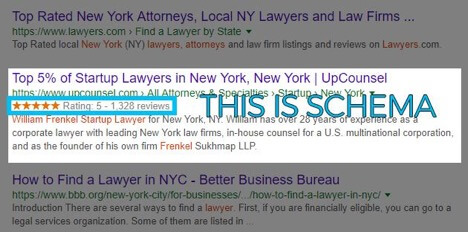Attorney Search Engine Optimization (SEO) requires strategic planning, careful techniques and smart tactics to attract more prospective clients to your law firm.
If you’re unfamiliar if SEO, this is the standard practice of configuring both on-site and off-site elements of your website. The purpose of SEO for lawyers is to push their website to the first page of search engines (e.g. Google, Yahoo, Bing, etc.). This is important.
In this article, you will get some insights on SEO for attorneys while learning a few skills to improve your website and increasing the likelihood of finding more customers online.
WHAT YOU SHOULD KNOW ABOUT ATTORNEY SEO
Before revealing some methods you can use to improve your website’s SEO, you should know a few things about the nature of search engines.
First, Google dominates the search engine industry. There are somewhere between 60 to 80% of searchers using their service. However, when it comes to SEO for lawyers, other search engines like Yahoo and Bing should be considered as prospective clients can be found there too.
Next, getting your law firm’s website ranked is both vital and challenging. Research on Google’s search results has discovered that about 91.5% of searchers make their choices based on what they find on the first page. Take a look at the remainder of the pages:
- Page 2: 8%
- Page 3: 1%
- Page 4: 4%
There are paid methods of getting your website to the front page, (i.e. PPC lawyer campaigns), however to save on spending SEO allows you to drive more organic visitors to your website.
Did you know? Depending on your niche, industry and the keywords your web pages rank for, organic listings can receive up to 90% of clicks.
SEO FOR ATTORNEY: WHAT TO DO
There is a critical thing to know about SEO for attorneys. Marketing online for lawyers and law firms must abide by the rules and regulations detailed by the state bar associations.
Careful considerations must be made when representing your law firm online. Performing ethical SEO will allow you to rank on the first page of search engines without any penalties. Here’s a few things you can do.
Lawyer SEO Keyword Research
Keyword research is always the foundation for any SEO strategy. You can optimize your website by focusing on keywords that have purchasing intentions. This means that you should use specific words people are searching for which will lead to them sign up for your services.
You will find that these search terms and phrases will have a high volume compared to others.
Also, slight variations in phrases can lead to a significant difference in the volume of traffic and click you receive. For example, if someone was searching for “NYC divorce attorney” they are likely to receive more searches than for “NYC divorce attorney.” The term “lawyer” tends to be used more frequently than “attorney.”
You can use Google’s keyword planner to get a basic understanding of which keywords are being used and which ones you should add to your website.
Here are some tips to guide your keyword research for effective attorney SEO:
- Make a list of terms related to your practice area (i.e. divorce lawyer, Family divorce lawyers, etc.)
- Compare multiple variations of your keyword phrases to find what people are actually searching for.
- Focus on high search volume keywords with moderate competition.
- Also, consider low competition keywords that can be easily targeted.
- Dedicate pages using phrases and terms that are related to your main keyword phrase (i.e. divorce lawyers in NYC, NYC divorce lawyers, etc.)
- Research the keywords your competitors are using and ranking for, then make better content that ranks higher.
Local SEO for Attorneys
Most law firms are operating from a single community which makes targeting prospective clients very competitive. In order to get your website noticed, local lawyer SEO allows you to target your website toward particular demographics in your area.
Here’s a few ways to improve your local attorney SEO:
- Sign up for Google My Business profile.
- Sign up for Bing Business Listings.
- Sign up for Yext and get your website listed on hundreds of local websites.
- Sign up for AVVO.
- Create a location specific page (i.e. Divorce Lawyer in NYC) using specific terms that get your page ranked.
Attorney SEO: Schema Markup
Schema markup is HTML code which makes the content on your website easily understood by machines. Schema’s are important as they allow search engines to figure out the real meaning behind the content being displayed on your website.
There is a dedicated set of schema you can apply to your website that lets search engines understand that your website is related to a law firm of legal profession.
You can apply this schema markup to content like:
- Addresses
- Attorney Biographies
- Attorney Names
- Client Reviews
- Emails
- Phone Numbers
Using schema is a great way to get your site to stand out in the search engines. When you use schema markup, your website will have additional visible features such as star ratings, business logo, and contact info.
SEO Attorney Strategy: Link Building
In 2016, Google announced that links were one of the major factors that influence how a page is ranked in the searches. To get your push your rankings toward the first page, you will have to dedicate a significant amount of time building links from other websites. However, not all links are the same.
You need to get your lawyer website on high ranking websites. For lawyers, these are websites like AVVO, Lawyers.com, Justia, Super Lawyers. Getting your website linked on these sites will add authority and can likely boost your rankings in the search engines.
Keep in mind, it takes more than one or two links to start seeing some changes. Getting quality backlinks is a tiresome and exhaustive effort. When building backlinks to your law firm, be sure not to put your links on too many bad sites. You don’t want your site to be penalize for unethical backlink marketing.
Summary of SEO For Attorneys
SEO for attorneys is a necessity in order to get your law firm or legal service to stand out in the search engines.
Start with researching the right keywords for your website. Once you have those, build pages and posts around those keywords. On a deeper level, add schema markup to help search engines understand what your website is all about. And finally, make as many high quality backlinks as possible.




